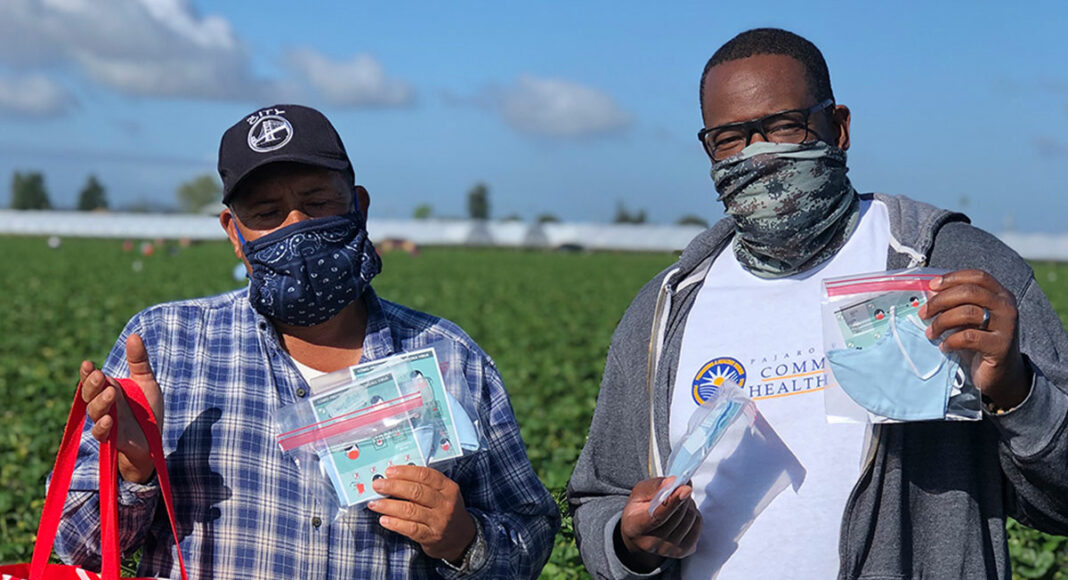Pajaro Valley Community Health Trust Executive Director DeAndre James on Tuesday confirmed that the nonprofit healthcare foundation will fund Watsonville’s youth sports programs if the City Council at its June 23 meeting approves a full-scale cut of the city’s sports programming for the 2020/21 fiscal year.
James said he reached out to Watsonville City Manager Matt Huffaker when he heard from the community about the proposed slashes to programs, which he called “vital” to Pajaro Valley’s young people.
“We thought, ‘How can we continue to support the community’s health and wellness?’ Especially for our youth during this time of Covid-19 when the schools and community have been going through difficult times,” James said.
Watsonville is facing a projected $6.5 million general fund budget deficit next fiscal year, much of it a result of revenue loss and a predicted slow recovery from the shelter-in-place orders put in place to slow the spread of the novel coronavirus.
Staff at the June 9 city council meeting proposed roughly $3 million worth of cuts to salaries and benefits. Staff is proposing the remaining deficit be covered by trimming its discretionary spending, reallocating its special revenue funds and using half of its $4.4 million emergency fund balance.
Included in those cuts was the Parks and Community Service (PCS) department’s sports division, previously budgeted for $338,737 during the biennial budget passed by the council in 2019. The proposed cuts also include laying off three full-time PCS staffers.
James said the Health Trust will only cover youth sports programs, which include recreational and competitive soccer, gymnastics and itty bitty sports, a multi-sport program aimed at kids under age 5.
The city was planning to use roughly $87,000 to run its sports programs, including its adult sports leagues such as men and women’s basketball and softball.
But finding the funds to keep sports going is not the only issue at hand, Huffaker said.
State and county health officials have yet to release guidance for youth sports and have not yet set a date for when they can resume. Santa Cruz County Health Officer Dr. Gail Newel in a June 11 press conference said that Gov. Gavin Newsom has made youth sports a priority, and she expected the state to release guidelines in roughly a week.
That guidance, however, might come after Tuesday’s meeting, making the council’s decision on the final budget that much tougher.
Both Huffaker and PCS Director Nick Calubaquib said the volatility of the countywide shelter-in-place restrictions made it tough to predict whether organized sports would be allowed in the upcoming fiscal year. But with state and county officials recently picking up the pace at which they are reopening various industries, organized sports could soon make a comeback.
“That being said, we plan to include an operating and revenue budget for sports programs in the budget for next week,” Calubaquib wrote in an email. “We anticipate that programs will need to operate differently than they did pre-Covid, based on state and county health guidelines, which may affect the cost to operate programs. Funds from the Health Trust could potentially be used to help support the program as we figure out how to address additional costs associated with operating.”
If the council does chop its sports programs, it could bring them back later this year. Finance Department Director Cindy Czerwin will return to the council in August when the city will have a better picture of its property and sales tax numbers. She will then return in November and again in February with additional updates.
More than two dozen members of the community voiced their concerns about the cuts during the June 9 meeting, some saying they are worried about the future of the programs beyond the 2020/21 fiscal year—which runs until July of next year—if they are removed.
James echoed those concerns.
“Some of these programs, they’re barely hanging on as it is,” he said. “If you cut them for a year, they might never come back.”
And community leader Barbie Gomez said there might not be any other affordable alternatives either if the city’s programs do fold.
Her nonprofit, 831 Youth Sports League, has for the last seven years provided affordable flag football and basketball programs for Watsonville’s young people in the summer and deep into the fall while schools are on break. The shelter-in-place restrictions, however, have sidelined both programs through the end of the year.
Gomez is now raising money to hopefully bring the programs back in 2021 by selling “Watsonville Strong” masks ($7-10) and T-shirts ($20). She said the nonprofit—which heavily relies on volunteer coaches—needs to raise $20,000 in order to offer the yearly programming.
“It’s sad that we’re not going to be able to provide these programs to kids who need things to do, places to be where they’re utilizing their time in a positive way,” she said. “That’s why it’s important for the city to keep sports running and flowing … They might be the only people who can offer affordable sports for our kids.”
James said he was “proud and happy” that the community reached out to the Health Trust, which he called the “People’s Champ” of health and wellness, for help with the youth sports programs. He said the decision to fund them was an easy one. James’ time on the basketball court and track helped keep him healthy and out of trouble in his younger days, he said.
“I was too busy to get in trouble because I played sports,” he said. “You need outlets. You need places to let that energy out—places where you can have success as a kid. Sometimes you don’t see success in the classroom but you see success [in sports] and that might bring you to want to be more successful in the classroom. It’s huge for the kids in the community to have a place where they can go.”











